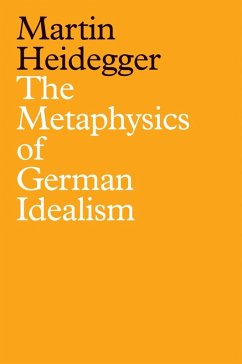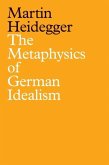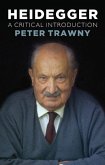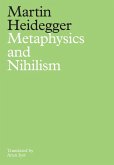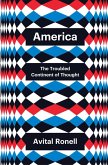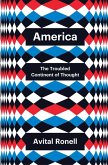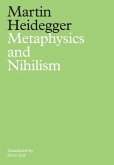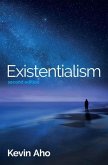Martin HeideggerA New Interpretation of Schelling's Philosophical Investigations Into the Essence of Human Freedom and Matters
The Metaphysics of German Idealism
A New Interpretation of Schelling's Philosophical Investigations Into the Essence of Human Freedom and Matters
Übersetzer: Moore, Ian Alexander; Therezo, Rodrigo
Martin HeideggerA New Interpretation of Schelling's Philosophical Investigations Into the Essence of Human Freedom and Matters
The Metaphysics of German Idealism
A New Interpretation of Schelling's Philosophical Investigations Into the Essence of Human Freedom and Matters
Übersetzer: Moore, Ian Alexander; Therezo, Rodrigo
- Broschiertes Buch
- Merkliste
- Auf die Merkliste
- Bewerten Bewerten
- Teilen
- Produkt teilen
- Produkterinnerung
- Produkterinnerung
"A major work by one of the most influential philosophers of the 20th century, published here in English for the first time"--
Andere Kunden interessierten sich auch für
![The Metaphysics of German Idealism The Metaphysics of German Idealism]() Martin HeideggerThe Metaphysics of German Idealism61,99 €
Martin HeideggerThe Metaphysics of German Idealism61,99 €![Heidegger Heidegger]() Peter TrawnyHeidegger22,99 €
Peter TrawnyHeidegger22,99 €![Metaphysics and Nihilism Metaphysics and Nihilism]() Martin HeideggerMetaphysics and Nihilism25,99 €
Martin HeideggerMetaphysics and Nihilism25,99 €![America America]() Avital RonellAmerica16,99 €
Avital RonellAmerica16,99 €![America America]() Avital RonellAmerica46,99 €
Avital RonellAmerica46,99 €![Metaphysics and Nihilism Metaphysics and Nihilism]() Martin HeideggerMetaphysics and Nihilism67,99 €
Martin HeideggerMetaphysics and Nihilism67,99 €![Existentialism Existentialism]() Kevin AhoExistentialism28,99 €
Kevin AhoExistentialism28,99 €-
-
-
"A major work by one of the most influential philosophers of the 20th century, published here in English for the first time"--
Produktdetails
- Produktdetails
- Verlag: John Wiley and Sons Ltd
- Seitenzahl: 208
- Erscheinungstermin: 2. September 2025
- Englisch
- Abmessung: 229mm x 155mm x 18mm
- Gewicht: 322g
- ISBN-13: 9781509540112
- ISBN-10: 1509540113
- Artikelnr.: 73401961
- Herstellerkennzeichnung
- Libri GmbH
- Europaallee 1
- 36244 Bad Hersfeld
- gpsr@libri.de
- Verlag: John Wiley and Sons Ltd
- Seitenzahl: 208
- Erscheinungstermin: 2. September 2025
- Englisch
- Abmessung: 229mm x 155mm x 18mm
- Gewicht: 322g
- ISBN-13: 9781509540112
- ISBN-10: 1509540113
- Artikelnr.: 73401961
- Herstellerkennzeichnung
- Libri GmbH
- Europaallee 1
- 36244 Bad Hersfeld
- gpsr@libri.de
MARTIN HEIDEGGER (1889-1976) was one of the most influential philosophers of the twentieth century and the author of numerous works including Being and Time.
Translators' Introduction
INTRODUCTION
THE NECESSITY OF A HISTORICAL THINKING
§ 1. Schelling's Treatise as the Peak of the Metaphysics of German Idealism
§ 2. Historical Thinking, Historiographic Explanation, Systematic
Reflection
§ 3. Elucidations of the Title of the Treatise
§ 4. The Organization of the Treatise
§ 5. Brief Excursus on a Further Misgiving (the Historiographic - the
Current - That Which Has Been)
PART I
PRELIMINARY REFLECTION ON THE DISTINCTION BETWEEN GROUND AND EXISTENCE
§ 6. The Core Section of the Treatise: The Distinction between Essence
Insofar as It Exists and Essence Insofar as it Is Merely Ground of
Existence
§ 7. The Organization of the Preliminary Reflection
First Chapter
The Conceptual-Historical Elucidation of Ground and Existence
§ 8. Essentia and Existentia
§ 9. "Existence" and "Philosophy of Existence" (K. Jaspers)
§ 10. Kierkegaard's Concept of Existence
§ 11. Kierkegaard, "Philosophy of Existence," and Being and Time (1927)
a) What Occasion Is There for Classifying Being and Time as "Philosophy
of Existence"?
) Analytic of Existence
) Existence - As Understood in the Sense of Kierkegaard's Restriction of
It
) Philosophy of Anxiety, of the Nothing, of Death, of Care . . .
) Philosophical Anthropology
b) Rejection of the Classification of Being and Time as Philosophy of
Existence by Way of an Elucidation of the Concepts of Existence and Da-sein
(Elucidations of Being and Time)
) Existence and Dasein as Meaning "Actuality in General" (As Understood in
Traditional Usage of Language)
) Dasein as the Bodily-Psychic-Rational Being-Actual of the Human, and
Existence as the Subjectivity of Self-Being (Jaspers)
) "Existentiell" and "Existential" Concepts of Existence
) "Understanding of Being" as the Decisive Determination of Dasein and
Existence in Being and Time
) Dasein, Temporality, and Time
) Temporality, Da-sein, Existence
) Anxiety, Death, Guilt, the Nothing within the Realm of Questioning in
Being and Time
) The "Essence" of Da-sein
) Understanding of Being, and Being
) Being and the Human - Anthropomorphism
§ 12. Preliminary Interpretation of Schelling's Concept of Existence
§ 13. The Inceptive Impetuses Determining the Essence of Ground and Their
Historical Transformation
Second Chapter
The Root of Schelling's Distinction between Ground and Existence
§ 14. Elucidation of the Essential Determination of Being as Willing
a) The Essential Predicates of Being
) Ground-lessness
) Eternity
) Independence from Time
) Self-Affirmation
b) Justification of the Predicates of Being
c) In What Way Willing Is Sufficient for the Predicates of Being
d) Being in Its Highest and Ultimate Jurisdiction
§ 15. Being as Willing as the Root of the Distinction between Ground and
Existence
Third Chapter
The Inner Necessity of Schelling's Distinction between Ground and Existence
Fourth Chapter
The Various Formulations of Schelling's Distinction between Ground and
Existence
§ 16. The Proper Aim of the Interpretation of the Freedom Treatise:
Reaching the Fundamental Position of the Metaphysics of German Idealism.
Evil and the System
§ 17. Transition from the Preliminary Reflection to the Interpretation of
the Core Section of the Treatise and of the Latter Itself
PART II
AN INTERPRETATION OF THE CORE SECTION, "THE ELUCIDATION OF THE DISTINCTION"
BETWEEN GROUND AND EXISTENCE
§ 18. The "Elucidation of the Distinction" as the Presentation of Beings as
a Whole (God, World, Human)
First Chapter
The Reflection that Takes God as a Starting Point
§ 19. The Direct Elucidation: The Presentation of the Being of Beings "in"
God. Philosophy as Unconditional Knowledge of the Absolute in Contrast to
Theology and Mathematics. The Various Senses of the Word "Nature"
a) Philosophy and Theology
b) Philosophy and Mathematics
c) The Concept of the Absolute in Schelling and Hegel
§ 20. The Analogical Elucidation: Presentation of the Correspondence
Between the Stations of the Being of the Absolute
§ 21. The Circularity of the Distinction Between Ground and Existence
§ 22. Summary of What Was Said about the Distinction in God
§ 23. Excursus: The Unconditional Precedence of the Certainty (That Is to
Say, Concurrently: the Beingness) of the Absolute
Second Chapter
The Reflection that Takes its Point of Departure from Things
§ 24. The Ground in God as "Originary Yearning"
§ 25. Creation as Formation through the Imagination; the Creature as
"Image"
Third Chapter
The Reflection that Takes its Point of Departure from the Human
§ 26. The Necessity of Creation and the Essence of the Human as the Proper
Creature in which God Himself Reveals Himself
§ 27. Human Will as "Divine Glimpse of Life" and "Seed of God"
CONCLUSION
OVERVIEW
§ 28 The "Distinction" and the Essence of Freedom and of Human Freedom in
Particular
§ 29 The "Distinction" in its Full Essence
§ 30. The "Distinction" and the Essence of the Human
§ 31. The Essence of Evil
§ 32. Evil and the System
§ 33. The System and the Truth (Certainty) of Beings as a Whole
§ 34. What Confrontation Means with Respect to Metaphysics
RECAPITULATIONS AND COURSE OF THE INTERPRETATION
Recapitulation of 14 January
Recapitulation of 21 January
Recapitulation of 28 January
Recapitulation of 4 February
Recapitulation of 11 February
Recapitulation of 18 February
Recapitulation of 25 February
Recapitulation of 4 March
Recapitulation of 11 March
APPENDIX
Preliminary Glimpses and Directives
Transitional Reflection on Hegel
The Confrontation with the Metaphysics of German Idealism and with
Metaphysics in General
Supplement (Leibniz)
German-English Glossary
English-German Glossary
Greek/Latin-English Lexicon
INTRODUCTION
THE NECESSITY OF A HISTORICAL THINKING
§ 1. Schelling's Treatise as the Peak of the Metaphysics of German Idealism
§ 2. Historical Thinking, Historiographic Explanation, Systematic
Reflection
§ 3. Elucidations of the Title of the Treatise
§ 4. The Organization of the Treatise
§ 5. Brief Excursus on a Further Misgiving (the Historiographic - the
Current - That Which Has Been)
PART I
PRELIMINARY REFLECTION ON THE DISTINCTION BETWEEN GROUND AND EXISTENCE
§ 6. The Core Section of the Treatise: The Distinction between Essence
Insofar as It Exists and Essence Insofar as it Is Merely Ground of
Existence
§ 7. The Organization of the Preliminary Reflection
First Chapter
The Conceptual-Historical Elucidation of Ground and Existence
§ 8. Essentia and Existentia
§ 9. "Existence" and "Philosophy of Existence" (K. Jaspers)
§ 10. Kierkegaard's Concept of Existence
§ 11. Kierkegaard, "Philosophy of Existence," and Being and Time (1927)
a) What Occasion Is There for Classifying Being and Time as "Philosophy
of Existence"?
) Analytic of Existence
) Existence - As Understood in the Sense of Kierkegaard's Restriction of
It
) Philosophy of Anxiety, of the Nothing, of Death, of Care . . .
) Philosophical Anthropology
b) Rejection of the Classification of Being and Time as Philosophy of
Existence by Way of an Elucidation of the Concepts of Existence and Da-sein
(Elucidations of Being and Time)
) Existence and Dasein as Meaning "Actuality in General" (As Understood in
Traditional Usage of Language)
) Dasein as the Bodily-Psychic-Rational Being-Actual of the Human, and
Existence as the Subjectivity of Self-Being (Jaspers)
) "Existentiell" and "Existential" Concepts of Existence
) "Understanding of Being" as the Decisive Determination of Dasein and
Existence in Being and Time
) Dasein, Temporality, and Time
) Temporality, Da-sein, Existence
) Anxiety, Death, Guilt, the Nothing within the Realm of Questioning in
Being and Time
) The "Essence" of Da-sein
) Understanding of Being, and Being
) Being and the Human - Anthropomorphism
§ 12. Preliminary Interpretation of Schelling's Concept of Existence
§ 13. The Inceptive Impetuses Determining the Essence of Ground and Their
Historical Transformation
Second Chapter
The Root of Schelling's Distinction between Ground and Existence
§ 14. Elucidation of the Essential Determination of Being as Willing
a) The Essential Predicates of Being
) Ground-lessness
) Eternity
) Independence from Time
) Self-Affirmation
b) Justification of the Predicates of Being
c) In What Way Willing Is Sufficient for the Predicates of Being
d) Being in Its Highest and Ultimate Jurisdiction
§ 15. Being as Willing as the Root of the Distinction between Ground and
Existence
Third Chapter
The Inner Necessity of Schelling's Distinction between Ground and Existence
Fourth Chapter
The Various Formulations of Schelling's Distinction between Ground and
Existence
§ 16. The Proper Aim of the Interpretation of the Freedom Treatise:
Reaching the Fundamental Position of the Metaphysics of German Idealism.
Evil and the System
§ 17. Transition from the Preliminary Reflection to the Interpretation of
the Core Section of the Treatise and of the Latter Itself
PART II
AN INTERPRETATION OF THE CORE SECTION, "THE ELUCIDATION OF THE DISTINCTION"
BETWEEN GROUND AND EXISTENCE
§ 18. The "Elucidation of the Distinction" as the Presentation of Beings as
a Whole (God, World, Human)
First Chapter
The Reflection that Takes God as a Starting Point
§ 19. The Direct Elucidation: The Presentation of the Being of Beings "in"
God. Philosophy as Unconditional Knowledge of the Absolute in Contrast to
Theology and Mathematics. The Various Senses of the Word "Nature"
a) Philosophy and Theology
b) Philosophy and Mathematics
c) The Concept of the Absolute in Schelling and Hegel
§ 20. The Analogical Elucidation: Presentation of the Correspondence
Between the Stations of the Being of the Absolute
§ 21. The Circularity of the Distinction Between Ground and Existence
§ 22. Summary of What Was Said about the Distinction in God
§ 23. Excursus: The Unconditional Precedence of the Certainty (That Is to
Say, Concurrently: the Beingness) of the Absolute
Second Chapter
The Reflection that Takes its Point of Departure from Things
§ 24. The Ground in God as "Originary Yearning"
§ 25. Creation as Formation through the Imagination; the Creature as
"Image"
Third Chapter
The Reflection that Takes its Point of Departure from the Human
§ 26. The Necessity of Creation and the Essence of the Human as the Proper
Creature in which God Himself Reveals Himself
§ 27. Human Will as "Divine Glimpse of Life" and "Seed of God"
CONCLUSION
OVERVIEW
§ 28 The "Distinction" and the Essence of Freedom and of Human Freedom in
Particular
§ 29 The "Distinction" in its Full Essence
§ 30. The "Distinction" and the Essence of the Human
§ 31. The Essence of Evil
§ 32. Evil and the System
§ 33. The System and the Truth (Certainty) of Beings as a Whole
§ 34. What Confrontation Means with Respect to Metaphysics
RECAPITULATIONS AND COURSE OF THE INTERPRETATION
Recapitulation of 14 January
Recapitulation of 21 January
Recapitulation of 28 January
Recapitulation of 4 February
Recapitulation of 11 February
Recapitulation of 18 February
Recapitulation of 25 February
Recapitulation of 4 March
Recapitulation of 11 March
APPENDIX
Preliminary Glimpses and Directives
Transitional Reflection on Hegel
The Confrontation with the Metaphysics of German Idealism and with
Metaphysics in General
Supplement (Leibniz)
German-English Glossary
English-German Glossary
Greek/Latin-English Lexicon
Translators' Introduction
INTRODUCTION
THE NECESSITY OF A HISTORICAL THINKING
1. Schelling's Treatise as the Peak of the Metaphysics of German Idealism
2. Historical Thinking, Historiographic Explanation, Systematic Reflection
3. Elucidations of the Title of the Treatise
4. The Organization of the Treatise
5. Brief Excursus on a Further Misgiving (the Historiographic - the Current - That Which Has Been)
PART I
PRELIMINARY REFLECTION ON THE DISTINCTION BETWEEN GROUND AND EXISTENCE
6. The Core Section of the Treatise: The Distinction between Essence Insofar as It Exists and Essence Insofar as it Is Merely Ground of Existence
7. The Organization of the Preliminary Reflection
First Chapter
The Conceptual-Historical Elucidation of Ground and Existence
8. Essentia and Existentia
9. "Existence" and "Philosophy of Existence" (K. Jaspers)
10. Kierkegaard's Concept of Existence
11. Kierkegaard, "Philosophy of Existence," and Being and Time (1927)
a) What Occasion Is There for Classifying Being and Time as "Philosophy of Existence"?
) Analytic of Existence
) Existence - As Understood in the Sense of Kierkegaard's Restriction of It
) Philosophy of Anxiety, of the Nothing, of Death, of Care . . .
) Philosophical Anthropology
b) Rejection of the Classification of Being and Time as Philosophy of Existence by Way of an Elucidation of the Concepts of Existence and Da-sein (Elucidations of Being and Time)
) Existence and Dasein as Meaning "Actuality in General" (As Understood in Traditional Usage of Language)
) Dasein as the Bodily-Psychic-Rational Being-Actual of the Human, and Existence as the Subjectivity of Self-Being (Jaspers)
) "Existentiell" and "Existential" Concepts of Existence
) "Understanding of Being" as the Decisive Determination of Dasein and Existence in Being and Time
) Dasein, Temporality, and Time
) Temporality, Da-sein, Existence
) Anxiety, Death, Guilt, the Nothing within the Realm of Questioning in Being and Time
) The "Essence" of Da-sein
) Understanding of Being, and Being
) Being and the Human - Anthropomorphism
12. Preliminary Interpretation of Schelling's Concept of Existence
13. The Inceptive Impetuses Determining the Essence of Ground and Their Historical Transformation
Second Chapter
The Root of Schelling's Distinction between Ground and Existence
14. Elucidation of the Essential Determination of Being as Willing
a) The Essential Predicates of Being
) Ground-lessness
) Eternity
) Independence from Time
) Self-Affirmation
b) Justification of the Predicates of Being
c) In What Way Willing Is Sufficient for the Predicates of Being
d) Being in Its Highest and Ultimate Jurisdiction
15. Being as Willing as the Root of the Distinction between Ground and Existence
Third Chapter
The Inner Necessity of Schelling's Distinction between Ground and Existence
Fourth Chapter
The Various Formulations of Schelling's Distinction between Ground and Existence
16. The Proper Aim of the Interpretation of the Freedom Treatise: Reaching the Fundamental Position of the Metaphysics of German Idealism. Evil and the System
17. Transition from the Preliminary Reflection to the Interpretation of the Core Section of the Treatise and of the Latter Itself
PART II
AN INTERPRETATION OF THE CORE SECTION, "THE ELUCIDA
INTRODUCTION
THE NECESSITY OF A HISTORICAL THINKING
1. Schelling's Treatise as the Peak of the Metaphysics of German Idealism
2. Historical Thinking, Historiographic Explanation, Systematic Reflection
3. Elucidations of the Title of the Treatise
4. The Organization of the Treatise
5. Brief Excursus on a Further Misgiving (the Historiographic - the Current - That Which Has Been)
PART I
PRELIMINARY REFLECTION ON THE DISTINCTION BETWEEN GROUND AND EXISTENCE
6. The Core Section of the Treatise: The Distinction between Essence Insofar as It Exists and Essence Insofar as it Is Merely Ground of Existence
7. The Organization of the Preliminary Reflection
First Chapter
The Conceptual-Historical Elucidation of Ground and Existence
8. Essentia and Existentia
9. "Existence" and "Philosophy of Existence" (K. Jaspers)
10. Kierkegaard's Concept of Existence
11. Kierkegaard, "Philosophy of Existence," and Being and Time (1927)
a) What Occasion Is There for Classifying Being and Time as "Philosophy of Existence"?
) Analytic of Existence
) Existence - As Understood in the Sense of Kierkegaard's Restriction of It
) Philosophy of Anxiety, of the Nothing, of Death, of Care . . .
) Philosophical Anthropology
b) Rejection of the Classification of Being and Time as Philosophy of Existence by Way of an Elucidation of the Concepts of Existence and Da-sein (Elucidations of Being and Time)
) Existence and Dasein as Meaning "Actuality in General" (As Understood in Traditional Usage of Language)
) Dasein as the Bodily-Psychic-Rational Being-Actual of the Human, and Existence as the Subjectivity of Self-Being (Jaspers)
) "Existentiell" and "Existential" Concepts of Existence
) "Understanding of Being" as the Decisive Determination of Dasein and Existence in Being and Time
) Dasein, Temporality, and Time
) Temporality, Da-sein, Existence
) Anxiety, Death, Guilt, the Nothing within the Realm of Questioning in Being and Time
) The "Essence" of Da-sein
) Understanding of Being, and Being
) Being and the Human - Anthropomorphism
12. Preliminary Interpretation of Schelling's Concept of Existence
13. The Inceptive Impetuses Determining the Essence of Ground and Their Historical Transformation
Second Chapter
The Root of Schelling's Distinction between Ground and Existence
14. Elucidation of the Essential Determination of Being as Willing
a) The Essential Predicates of Being
) Ground-lessness
) Eternity
) Independence from Time
) Self-Affirmation
b) Justification of the Predicates of Being
c) In What Way Willing Is Sufficient for the Predicates of Being
d) Being in Its Highest and Ultimate Jurisdiction
15. Being as Willing as the Root of the Distinction between Ground and Existence
Third Chapter
The Inner Necessity of Schelling's Distinction between Ground and Existence
Fourth Chapter
The Various Formulations of Schelling's Distinction between Ground and Existence
16. The Proper Aim of the Interpretation of the Freedom Treatise: Reaching the Fundamental Position of the Metaphysics of German Idealism. Evil and the System
17. Transition from the Preliminary Reflection to the Interpretation of the Core Section of the Treatise and of the Latter Itself
PART II
AN INTERPRETATION OF THE CORE SECTION, "THE ELUCIDA
Translators' Introduction
INTRODUCTION
THE NECESSITY OF A HISTORICAL THINKING
§ 1. Schelling's Treatise as the Peak of the Metaphysics of German Idealism
§ 2. Historical Thinking, Historiographic Explanation, Systematic
Reflection
§ 3. Elucidations of the Title of the Treatise
§ 4. The Organization of the Treatise
§ 5. Brief Excursus on a Further Misgiving (the Historiographic - the
Current - That Which Has Been)
PART I
PRELIMINARY REFLECTION ON THE DISTINCTION BETWEEN GROUND AND EXISTENCE
§ 6. The Core Section of the Treatise: The Distinction between Essence
Insofar as It Exists and Essence Insofar as it Is Merely Ground of
Existence
§ 7. The Organization of the Preliminary Reflection
First Chapter
The Conceptual-Historical Elucidation of Ground and Existence
§ 8. Essentia and Existentia
§ 9. "Existence" and "Philosophy of Existence" (K. Jaspers)
§ 10. Kierkegaard's Concept of Existence
§ 11. Kierkegaard, "Philosophy of Existence," and Being and Time (1927)
a) What Occasion Is There for Classifying Being and Time as "Philosophy
of Existence"?
) Analytic of Existence
) Existence - As Understood in the Sense of Kierkegaard's Restriction of
It
) Philosophy of Anxiety, of the Nothing, of Death, of Care . . .
) Philosophical Anthropology
b) Rejection of the Classification of Being and Time as Philosophy of
Existence by Way of an Elucidation of the Concepts of Existence and Da-sein
(Elucidations of Being and Time)
) Existence and Dasein as Meaning "Actuality in General" (As Understood in
Traditional Usage of Language)
) Dasein as the Bodily-Psychic-Rational Being-Actual of the Human, and
Existence as the Subjectivity of Self-Being (Jaspers)
) "Existentiell" and "Existential" Concepts of Existence
) "Understanding of Being" as the Decisive Determination of Dasein and
Existence in Being and Time
) Dasein, Temporality, and Time
) Temporality, Da-sein, Existence
) Anxiety, Death, Guilt, the Nothing within the Realm of Questioning in
Being and Time
) The "Essence" of Da-sein
) Understanding of Being, and Being
) Being and the Human - Anthropomorphism
§ 12. Preliminary Interpretation of Schelling's Concept of Existence
§ 13. The Inceptive Impetuses Determining the Essence of Ground and Their
Historical Transformation
Second Chapter
The Root of Schelling's Distinction between Ground and Existence
§ 14. Elucidation of the Essential Determination of Being as Willing
a) The Essential Predicates of Being
) Ground-lessness
) Eternity
) Independence from Time
) Self-Affirmation
b) Justification of the Predicates of Being
c) In What Way Willing Is Sufficient for the Predicates of Being
d) Being in Its Highest and Ultimate Jurisdiction
§ 15. Being as Willing as the Root of the Distinction between Ground and
Existence
Third Chapter
The Inner Necessity of Schelling's Distinction between Ground and Existence
Fourth Chapter
The Various Formulations of Schelling's Distinction between Ground and
Existence
§ 16. The Proper Aim of the Interpretation of the Freedom Treatise:
Reaching the Fundamental Position of the Metaphysics of German Idealism.
Evil and the System
§ 17. Transition from the Preliminary Reflection to the Interpretation of
the Core Section of the Treatise and of the Latter Itself
PART II
AN INTERPRETATION OF THE CORE SECTION, "THE ELUCIDATION OF THE DISTINCTION"
BETWEEN GROUND AND EXISTENCE
§ 18. The "Elucidation of the Distinction" as the Presentation of Beings as
a Whole (God, World, Human)
First Chapter
The Reflection that Takes God as a Starting Point
§ 19. The Direct Elucidation: The Presentation of the Being of Beings "in"
God. Philosophy as Unconditional Knowledge of the Absolute in Contrast to
Theology and Mathematics. The Various Senses of the Word "Nature"
a) Philosophy and Theology
b) Philosophy and Mathematics
c) The Concept of the Absolute in Schelling and Hegel
§ 20. The Analogical Elucidation: Presentation of the Correspondence
Between the Stations of the Being of the Absolute
§ 21. The Circularity of the Distinction Between Ground and Existence
§ 22. Summary of What Was Said about the Distinction in God
§ 23. Excursus: The Unconditional Precedence of the Certainty (That Is to
Say, Concurrently: the Beingness) of the Absolute
Second Chapter
The Reflection that Takes its Point of Departure from Things
§ 24. The Ground in God as "Originary Yearning"
§ 25. Creation as Formation through the Imagination; the Creature as
"Image"
Third Chapter
The Reflection that Takes its Point of Departure from the Human
§ 26. The Necessity of Creation and the Essence of the Human as the Proper
Creature in which God Himself Reveals Himself
§ 27. Human Will as "Divine Glimpse of Life" and "Seed of God"
CONCLUSION
OVERVIEW
§ 28 The "Distinction" and the Essence of Freedom and of Human Freedom in
Particular
§ 29 The "Distinction" in its Full Essence
§ 30. The "Distinction" and the Essence of the Human
§ 31. The Essence of Evil
§ 32. Evil and the System
§ 33. The System and the Truth (Certainty) of Beings as a Whole
§ 34. What Confrontation Means with Respect to Metaphysics
RECAPITULATIONS AND COURSE OF THE INTERPRETATION
Recapitulation of 14 January
Recapitulation of 21 January
Recapitulation of 28 January
Recapitulation of 4 February
Recapitulation of 11 February
Recapitulation of 18 February
Recapitulation of 25 February
Recapitulation of 4 March
Recapitulation of 11 March
APPENDIX
Preliminary Glimpses and Directives
Transitional Reflection on Hegel
The Confrontation with the Metaphysics of German Idealism and with
Metaphysics in General
Supplement (Leibniz)
German-English Glossary
English-German Glossary
Greek/Latin-English Lexicon
INTRODUCTION
THE NECESSITY OF A HISTORICAL THINKING
§ 1. Schelling's Treatise as the Peak of the Metaphysics of German Idealism
§ 2. Historical Thinking, Historiographic Explanation, Systematic
Reflection
§ 3. Elucidations of the Title of the Treatise
§ 4. The Organization of the Treatise
§ 5. Brief Excursus on a Further Misgiving (the Historiographic - the
Current - That Which Has Been)
PART I
PRELIMINARY REFLECTION ON THE DISTINCTION BETWEEN GROUND AND EXISTENCE
§ 6. The Core Section of the Treatise: The Distinction between Essence
Insofar as It Exists and Essence Insofar as it Is Merely Ground of
Existence
§ 7. The Organization of the Preliminary Reflection
First Chapter
The Conceptual-Historical Elucidation of Ground and Existence
§ 8. Essentia and Existentia
§ 9. "Existence" and "Philosophy of Existence" (K. Jaspers)
§ 10. Kierkegaard's Concept of Existence
§ 11. Kierkegaard, "Philosophy of Existence," and Being and Time (1927)
a) What Occasion Is There for Classifying Being and Time as "Philosophy
of Existence"?
) Analytic of Existence
) Existence - As Understood in the Sense of Kierkegaard's Restriction of
It
) Philosophy of Anxiety, of the Nothing, of Death, of Care . . .
) Philosophical Anthropology
b) Rejection of the Classification of Being and Time as Philosophy of
Existence by Way of an Elucidation of the Concepts of Existence and Da-sein
(Elucidations of Being and Time)
) Existence and Dasein as Meaning "Actuality in General" (As Understood in
Traditional Usage of Language)
) Dasein as the Bodily-Psychic-Rational Being-Actual of the Human, and
Existence as the Subjectivity of Self-Being (Jaspers)
) "Existentiell" and "Existential" Concepts of Existence
) "Understanding of Being" as the Decisive Determination of Dasein and
Existence in Being and Time
) Dasein, Temporality, and Time
) Temporality, Da-sein, Existence
) Anxiety, Death, Guilt, the Nothing within the Realm of Questioning in
Being and Time
) The "Essence" of Da-sein
) Understanding of Being, and Being
) Being and the Human - Anthropomorphism
§ 12. Preliminary Interpretation of Schelling's Concept of Existence
§ 13. The Inceptive Impetuses Determining the Essence of Ground and Their
Historical Transformation
Second Chapter
The Root of Schelling's Distinction between Ground and Existence
§ 14. Elucidation of the Essential Determination of Being as Willing
a) The Essential Predicates of Being
) Ground-lessness
) Eternity
) Independence from Time
) Self-Affirmation
b) Justification of the Predicates of Being
c) In What Way Willing Is Sufficient for the Predicates of Being
d) Being in Its Highest and Ultimate Jurisdiction
§ 15. Being as Willing as the Root of the Distinction between Ground and
Existence
Third Chapter
The Inner Necessity of Schelling's Distinction between Ground and Existence
Fourth Chapter
The Various Formulations of Schelling's Distinction between Ground and
Existence
§ 16. The Proper Aim of the Interpretation of the Freedom Treatise:
Reaching the Fundamental Position of the Metaphysics of German Idealism.
Evil and the System
§ 17. Transition from the Preliminary Reflection to the Interpretation of
the Core Section of the Treatise and of the Latter Itself
PART II
AN INTERPRETATION OF THE CORE SECTION, "THE ELUCIDATION OF THE DISTINCTION"
BETWEEN GROUND AND EXISTENCE
§ 18. The "Elucidation of the Distinction" as the Presentation of Beings as
a Whole (God, World, Human)
First Chapter
The Reflection that Takes God as a Starting Point
§ 19. The Direct Elucidation: The Presentation of the Being of Beings "in"
God. Philosophy as Unconditional Knowledge of the Absolute in Contrast to
Theology and Mathematics. The Various Senses of the Word "Nature"
a) Philosophy and Theology
b) Philosophy and Mathematics
c) The Concept of the Absolute in Schelling and Hegel
§ 20. The Analogical Elucidation: Presentation of the Correspondence
Between the Stations of the Being of the Absolute
§ 21. The Circularity of the Distinction Between Ground and Existence
§ 22. Summary of What Was Said about the Distinction in God
§ 23. Excursus: The Unconditional Precedence of the Certainty (That Is to
Say, Concurrently: the Beingness) of the Absolute
Second Chapter
The Reflection that Takes its Point of Departure from Things
§ 24. The Ground in God as "Originary Yearning"
§ 25. Creation as Formation through the Imagination; the Creature as
"Image"
Third Chapter
The Reflection that Takes its Point of Departure from the Human
§ 26. The Necessity of Creation and the Essence of the Human as the Proper
Creature in which God Himself Reveals Himself
§ 27. Human Will as "Divine Glimpse of Life" and "Seed of God"
CONCLUSION
OVERVIEW
§ 28 The "Distinction" and the Essence of Freedom and of Human Freedom in
Particular
§ 29 The "Distinction" in its Full Essence
§ 30. The "Distinction" and the Essence of the Human
§ 31. The Essence of Evil
§ 32. Evil and the System
§ 33. The System and the Truth (Certainty) of Beings as a Whole
§ 34. What Confrontation Means with Respect to Metaphysics
RECAPITULATIONS AND COURSE OF THE INTERPRETATION
Recapitulation of 14 January
Recapitulation of 21 January
Recapitulation of 28 January
Recapitulation of 4 February
Recapitulation of 11 February
Recapitulation of 18 February
Recapitulation of 25 February
Recapitulation of 4 March
Recapitulation of 11 March
APPENDIX
Preliminary Glimpses and Directives
Transitional Reflection on Hegel
The Confrontation with the Metaphysics of German Idealism and with
Metaphysics in General
Supplement (Leibniz)
German-English Glossary
English-German Glossary
Greek/Latin-English Lexicon
Translators' Introduction
INTRODUCTION
THE NECESSITY OF A HISTORICAL THINKING
1. Schelling's Treatise as the Peak of the Metaphysics of German Idealism
2. Historical Thinking, Historiographic Explanation, Systematic Reflection
3. Elucidations of the Title of the Treatise
4. The Organization of the Treatise
5. Brief Excursus on a Further Misgiving (the Historiographic - the Current - That Which Has Been)
PART I
PRELIMINARY REFLECTION ON THE DISTINCTION BETWEEN GROUND AND EXISTENCE
6. The Core Section of the Treatise: The Distinction between Essence Insofar as It Exists and Essence Insofar as it Is Merely Ground of Existence
7. The Organization of the Preliminary Reflection
First Chapter
The Conceptual-Historical Elucidation of Ground and Existence
8. Essentia and Existentia
9. "Existence" and "Philosophy of Existence" (K. Jaspers)
10. Kierkegaard's Concept of Existence
11. Kierkegaard, "Philosophy of Existence," and Being and Time (1927)
a) What Occasion Is There for Classifying Being and Time as "Philosophy of Existence"?
) Analytic of Existence
) Existence - As Understood in the Sense of Kierkegaard's Restriction of It
) Philosophy of Anxiety, of the Nothing, of Death, of Care . . .
) Philosophical Anthropology
b) Rejection of the Classification of Being and Time as Philosophy of Existence by Way of an Elucidation of the Concepts of Existence and Da-sein (Elucidations of Being and Time)
) Existence and Dasein as Meaning "Actuality in General" (As Understood in Traditional Usage of Language)
) Dasein as the Bodily-Psychic-Rational Being-Actual of the Human, and Existence as the Subjectivity of Self-Being (Jaspers)
) "Existentiell" and "Existential" Concepts of Existence
) "Understanding of Being" as the Decisive Determination of Dasein and Existence in Being and Time
) Dasein, Temporality, and Time
) Temporality, Da-sein, Existence
) Anxiety, Death, Guilt, the Nothing within the Realm of Questioning in Being and Time
) The "Essence" of Da-sein
) Understanding of Being, and Being
) Being and the Human - Anthropomorphism
12. Preliminary Interpretation of Schelling's Concept of Existence
13. The Inceptive Impetuses Determining the Essence of Ground and Their Historical Transformation
Second Chapter
The Root of Schelling's Distinction between Ground and Existence
14. Elucidation of the Essential Determination of Being as Willing
a) The Essential Predicates of Being
) Ground-lessness
) Eternity
) Independence from Time
) Self-Affirmation
b) Justification of the Predicates of Being
c) In What Way Willing Is Sufficient for the Predicates of Being
d) Being in Its Highest and Ultimate Jurisdiction
15. Being as Willing as the Root of the Distinction between Ground and Existence
Third Chapter
The Inner Necessity of Schelling's Distinction between Ground and Existence
Fourth Chapter
The Various Formulations of Schelling's Distinction between Ground and Existence
16. The Proper Aim of the Interpretation of the Freedom Treatise: Reaching the Fundamental Position of the Metaphysics of German Idealism. Evil and the System
17. Transition from the Preliminary Reflection to the Interpretation of the Core Section of the Treatise and of the Latter Itself
PART II
AN INTERPRETATION OF THE CORE SECTION, "THE ELUCIDA
INTRODUCTION
THE NECESSITY OF A HISTORICAL THINKING
1. Schelling's Treatise as the Peak of the Metaphysics of German Idealism
2. Historical Thinking, Historiographic Explanation, Systematic Reflection
3. Elucidations of the Title of the Treatise
4. The Organization of the Treatise
5. Brief Excursus on a Further Misgiving (the Historiographic - the Current - That Which Has Been)
PART I
PRELIMINARY REFLECTION ON THE DISTINCTION BETWEEN GROUND AND EXISTENCE
6. The Core Section of the Treatise: The Distinction between Essence Insofar as It Exists and Essence Insofar as it Is Merely Ground of Existence
7. The Organization of the Preliminary Reflection
First Chapter
The Conceptual-Historical Elucidation of Ground and Existence
8. Essentia and Existentia
9. "Existence" and "Philosophy of Existence" (K. Jaspers)
10. Kierkegaard's Concept of Existence
11. Kierkegaard, "Philosophy of Existence," and Being and Time (1927)
a) What Occasion Is There for Classifying Being and Time as "Philosophy of Existence"?
) Analytic of Existence
) Existence - As Understood in the Sense of Kierkegaard's Restriction of It
) Philosophy of Anxiety, of the Nothing, of Death, of Care . . .
) Philosophical Anthropology
b) Rejection of the Classification of Being and Time as Philosophy of Existence by Way of an Elucidation of the Concepts of Existence and Da-sein (Elucidations of Being and Time)
) Existence and Dasein as Meaning "Actuality in General" (As Understood in Traditional Usage of Language)
) Dasein as the Bodily-Psychic-Rational Being-Actual of the Human, and Existence as the Subjectivity of Self-Being (Jaspers)
) "Existentiell" and "Existential" Concepts of Existence
) "Understanding of Being" as the Decisive Determination of Dasein and Existence in Being and Time
) Dasein, Temporality, and Time
) Temporality, Da-sein, Existence
) Anxiety, Death, Guilt, the Nothing within the Realm of Questioning in Being and Time
) The "Essence" of Da-sein
) Understanding of Being, and Being
) Being and the Human - Anthropomorphism
12. Preliminary Interpretation of Schelling's Concept of Existence
13. The Inceptive Impetuses Determining the Essence of Ground and Their Historical Transformation
Second Chapter
The Root of Schelling's Distinction between Ground and Existence
14. Elucidation of the Essential Determination of Being as Willing
a) The Essential Predicates of Being
) Ground-lessness
) Eternity
) Independence from Time
) Self-Affirmation
b) Justification of the Predicates of Being
c) In What Way Willing Is Sufficient for the Predicates of Being
d) Being in Its Highest and Ultimate Jurisdiction
15. Being as Willing as the Root of the Distinction between Ground and Existence
Third Chapter
The Inner Necessity of Schelling's Distinction between Ground and Existence
Fourth Chapter
The Various Formulations of Schelling's Distinction between Ground and Existence
16. The Proper Aim of the Interpretation of the Freedom Treatise: Reaching the Fundamental Position of the Metaphysics of German Idealism. Evil and the System
17. Transition from the Preliminary Reflection to the Interpretation of the Core Section of the Treatise and of the Latter Itself
PART II
AN INTERPRETATION OF THE CORE SECTION, "THE ELUCIDA
"Unlike the course he offered on the same subject five years earlier, Heidegger's 1941 lectures on Schelling's 'freedom treatise' demonstrate his decisive break from 'metaphysics,' including German idealism, and allow us to see more clearly the radical reorientation of his later thought. No less fascinating is the large portion of the present volume devoted to an interpretation of Kierkegaard's concept of existence and its relation to the (so-called) 'existentialism' of Being and Time. This excellent translation is a must-read for students and scholars alike."
Taylor Carman, Barnard College
"Heidegger's lecture course from 1941 not only attempts a new interpretation of Schelling's essay on the essence of human freedom, extending his 1936 treatment of that same text, but contains a wealth of material on Heidegger's ongoing reflections on the history of metaphysics and an important series of elucidations of Being and Time. This careful and sensitive translation will not only be of great interest to scholars of German Idealism, but is essential reading for anyone following Heidegger's own philosophical development."
William McNeill, DePaul University
Taylor Carman, Barnard College
"Heidegger's lecture course from 1941 not only attempts a new interpretation of Schelling's essay on the essence of human freedom, extending his 1936 treatment of that same text, but contains a wealth of material on Heidegger's ongoing reflections on the history of metaphysics and an important series of elucidations of Being and Time. This careful and sensitive translation will not only be of great interest to scholars of German Idealism, but is essential reading for anyone following Heidegger's own philosophical development."
William McNeill, DePaul University

